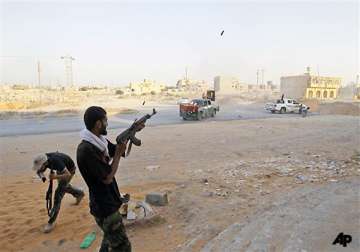Libyan Rebels Claim Victory South Of Tripoli
Tripoli, Aug 27: Libyan rebels claimed victory over a suburb near Tripoli's airport Saturday after an overnight battle as the opposition moves to solidify its hold on the capital while fighting Moammar Gadhafi loyalists in

Tripoli, Aug 27: Libyan rebels claimed victory over a suburb near Tripoli's airport Saturday after an overnight battle as the opposition moves to solidify its hold on the capital while fighting Moammar Gadhafi loyalists in other parts of the country.
Residents of Qasr bin Ghashir, about 20 miles (30 kilometers) south of the capital, celebrated by firing guns and anti-aircraft weapons into the air and beating portraits of the toppled leader with their shoes. Regime troops had been shelling the airport from the area.
“You can say that bin Ghashir has been liberated from Gadhafi soldiers,” said Omar al-Ghuzayl, a 45-year-old rebel field commander now in charge of forces at Tripoli's airport. “We've been able to push them completely outside Tripoli.”
The celebration reflected the rebels' optimism after days of fierce fighting in the capital, which now appears to be largely under rebel control.
Gadhafi's whereabouts remain unknown. NATO and rebel fighters are focusing on his hometown of Sirte, his last major bastion of support.
But while fighting has died down, much of the capital remained without electricity and water. Streets are strewn with torched cars and stinking garbage. Corpses crowd abandoned hospitals. Stores are closed. Bombed planes sit on the Tripoli's airport runway.
“We have a huge shortage of gas,” Tripoli resident Osama Shallouf said.
The shortages have made it difficult to bake the traditional pastries and buy new clothes to prepare for next week's Eid al-Fitr, the holiday that caps the Muslim fasting month of Ramadan.
“People will start celebrating when Gadhafi is caught,” he said. “That will be our Eid.”
Rebel leaders said Friday they'll establish a new interim government in the capital within 30 days, moving their headquarters from the eastern city of Benghazi, which fell into opposition hands early in the six-month civil war.
Mahmoud Jibril, the head of Libya's rebel National Transitional Council, said Friday the interim government needs about $5 billion in frozen assets to pay state salaries and maintain essential services, including the army and police force.
A British official, who would only discuss the details on condition of anonymity, said Friday that his government hopes to release about 1 billion pounds worth ($1.6 billion) of Libyan dinars printed in the U.K. to help the rebels. In March, Britain blocked the export of the bank notes, manufactured by a British currency printer.
The United States won approval on Thursday to release $1.5 billion in frozen Libyan assets held in American banks. And U.N. diplomats are working on lifting a freeze on tens of billions of dollars for Libya.
The rebels' information minister, Mahmoud Shammam, has said some who worked in the Gadhafi regime, but were sympathetic to the rebels, will be welcome in the interim government, which could make the transition smoother.
“The only people we are going to exclude are the people who killed others and stole money,” Shammam said.
Healing rifts won't be easy.
In the parking lot of an abandoned, bombed out fire station in Tripoli, Associated Press reporters saw rebels guarding four injured men they said were Gadhafi loyalists. Eventually, a rebel agreed to take as many wounded as he could fit in his pickup truck to a hospital, but was stopped repeatedly at checkpoints, where some kicked the prisoners, spat on them and tried to stop their transfer to the hospital.
Mohammed al-Egely, the rebels' justice minister, said he has visited detained Gadhafi fighters and that they were being treated according to international humanitarian law. He said the rebels are doing the best they can under the circumstances.
“We are in a state of war ,” he said. “Do you expect the fighters to bring them (prisoners) flowers? They are all fighting—and so there will be victims from each side.”
International organizations have expressed concern about treatment of detainees on both sides. AP